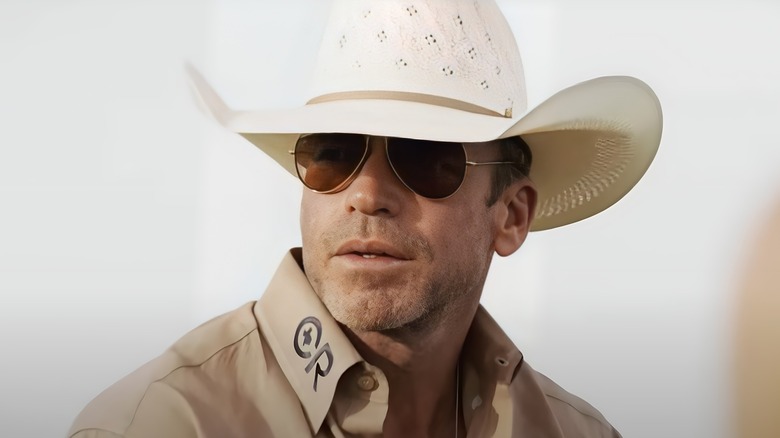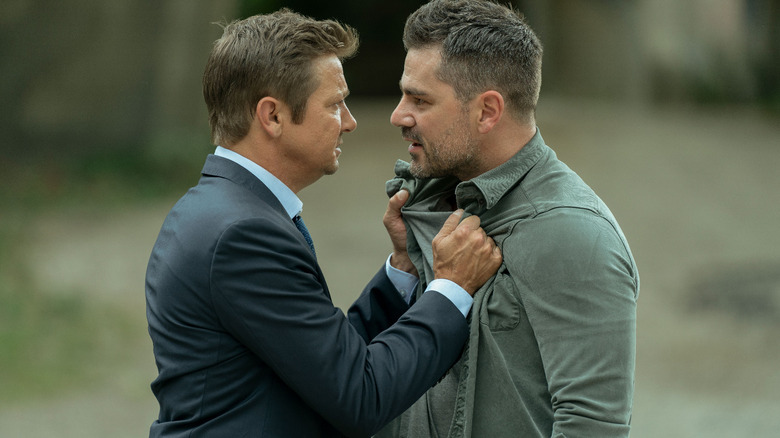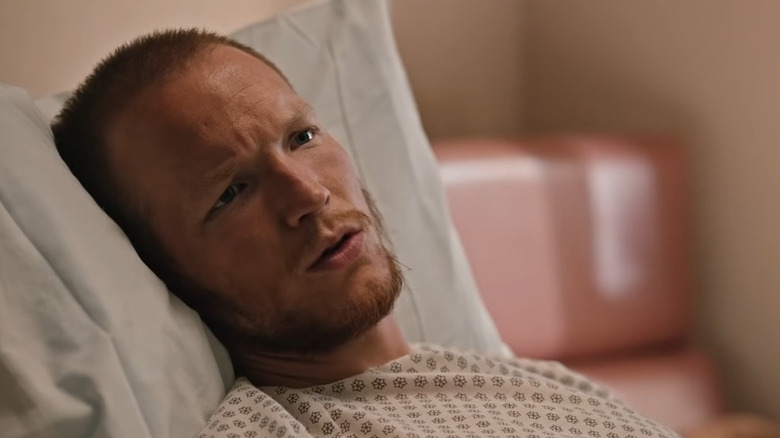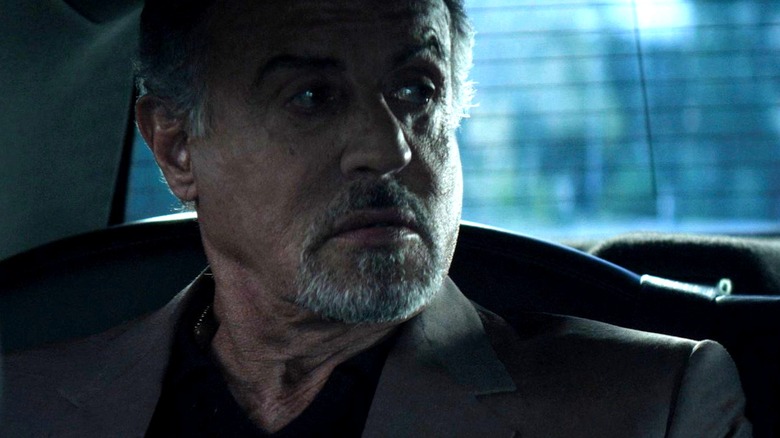Every Taylor Sheridan Show Has The Exact Same Problem
To Taylor Sheridan, television shows are like Pokémon badges, and he's very close to completing his set.
Sure, the hierarchy of power in the "Yellowstone" universe is about to change now that Kevin Costner is seemingly exiting the show, but there are still plenty of other stories Sheridan is in the middle of telling. Currently available to watch are two other gruff and grim eras of the Dutton dynasty, "1883" and "1923," and there's also the Jeremy Renner-starring "Mayor of Kingstown" and Sylvester Stallone's "Tulsa King."
Sheridan has more on the way, however. Yet to make their arrival to your watchlist are "Special Ops: Lioness" starring Zoe Saldaña and Nicole Kidman, and "Lawman: Bass Reeves" starring David Oyelowo in another extension of the Dutton timeline. Given Sheridan's success rate, even non-fans have to admit he's doing something right with his shows. Even so, there is one frustrating constant that Sheridan's worlds always share — one issue that pops up, over and over again, from series to series.
From the doorstep of the Dutton home to the prison gates that Mike McLusky spends so much time avoiding, every show seems full of lawless men answering to no one, even if said lawlessness goes against all rhyme, reason, or normal legal consequences. As a result, when Sheridan is letting egos clash or burly guys shed a single tear, he's overlooking a recurring issue that, if rectified, could make his work better than it already is.
Crooked characters get carte blanche in Taylor Sheridan's shows — and it's never clear why
As early as the first season of "Yellowstone," Sheridan's land-hungry family didn't so much as break the law as act like it didn't even exist. There was no solid explanation about how the Duttons became a force to be reckoned with in Montana. They simply are. Absolute power has corrupted absolutely, and that's all there is to it.
The likes of John Dutton (Kevin Costner) and Kayce (Luke Grimes) walk in and out of encounters with the law hassle-free, almost making estranged attorney son Jamie (Wes Bentley) feel even more unwanted than he already is. What backhanded deals were done to ensure that John Dutton could walk onto a crime scene and demand answers from cowering police officers? It's never clarified. The truth is that John Dutton is Montana's unofficial governor long before it's made official, and that's the norm in Sheridan's shows.
Jeremy Renner's "Mayor of Kingstown," Mike McLusky, has similar reach and involvement in matters that he has no reason to be. Why? Because his brother and his father before him were "fixers," allowing him to make dirty deals happen that others can't. It's a song we've heard before. Under Sheridan's watch, though, things always go super-sized. Renner's hero is calling the shots whether he's with the police and even the FBI, with the first season finale even seeing him act as a hostage negotiator during a prison breakout.
The repeating point here is that the show seems to side with the morally dubious characters doing morally dubious things, but never questions the how, why, or sense of it. In Sheridan-land, "good guys" have to do bad things, and anybody mildly purer of heart gets run over.
Good guys don't last long in Taylor Sheridan's shows, to a repetitive degree
There's no doubt that characters like Rip Wheeler (Cole Hauser) from "Yellowstone" or Tim McGraw's James Dutton from "1883" are characters audiences are drawn to because of their skewed morality and itchy trigger fingers. Lost souls trying to do right, even if it means getting their hands excessively dirty, is a hook that always works. At some point, though, it feels excessive — especially when every Sheridan show goes out of its way to tear apart any of the genuinely good people unlucky enough to end up there.
In Sheridan's shows, the good die young, or get booted out of a show. A prime example would be rodeo hero-in-the-making Jimmy Hurdstram (Jefferson White), the reluctant Dutton ranch hand in "Yellowstone," who almost acted like the audience surrogate. It's almost as if a good soul had no place among the corrupted ones on Dutton land. Elsewhere in Sheridan-land, "Mayor of Kingstown" has Mike's mother, Mariam (Dianne Wiest), who feels like the show's conscience personified, but her voice of reason is intentionally drowned out and seen as not worth listening to. On "1883," meanwhile, Elsa Dutton (Isabel May) is one of the good ones who doesn't make it to the promised land, while the bitter and mournful types like Sam Elliot's character get to throw their weight around unquestioned.
Justice needs to come to Taylor Sheridan's most beloved characters, whether they like it or not
Despite how renegade-fueled Sheridan's shows are, it's surprisingly rare that we see law-breaking characters collide with law-abiding ones. In Sheridan programs, a good cop in a bad town is a rarity, and shouldn't be. Sure, the argument could be made that such a plot development would limit the John Duttons of the Sheridanverse, but that's the point — it would bring conflict and tension into the mix. Such ongoing altercations have thrived in shows like "Justified," "The Shield," not to mention Sheridan's own role as lawman David Hale in "Sons of Anarchy." Sheridan himself wrote this exact kind of conflict into his movies "Hell or High Water," "Sicario," and "Wind River," so why doesn't he do the same for his television efforts?
In this regard, while the Sylvester Stallone-starring mob drama "Tulsa King" certainly follows the same guidebook as Sheridan's other TV shows, it's also a step in the right direction. Sly's Dwight "The General" Manfredi, a relocated mobster, doesn't get totally free reign if only because of his romantic relationship with a senior ATF agent (Andrea Savage), and the fact that Manfredi — unlike the Duttons — has to answer to someone is, frankly, refreshing. "Tulsa King" comes within striking distance of Sheridan actually examining, rather than aligning with, the inherent moral complexity of his characters, and it bodes well for the future programs he has on the way.
Lioness and Lawmen could be the shows that fix Sheridan's recurring issue
It's too early for a verdict on Taylor Sheridan's two upcoming shows, "Special Ops: Lioness" and "Lawmen: Bass Reeves." However, given the nature of those two premises, it seems very probably that justice will finally be served in a way Sheridan hasn't done in his prior shows.
"Special Ops: Lioness," for one, follows a marine tasked with befriending a terrorist's daughter on the CIA wanted list — guaranteeing that at some point, someone will have to answer for their crimes in a way the Duttons or Mike McLusky has brushed off with ease. As for the third "Yellowstone" spin-off, "Lawmen: Bass Reeves," the series will follow the legendary real-life first Black Deputy U.S. Marshall of the same name, and that story automatically demands at least some element of law and order, and an in-depth examination of that time period's historical issues.
These two shows feel like a perfect evolution for Sheridan's style. They are tales where matters of morality can't be ignored, and characters at the center of the plot will be forced to reflect on their actions, whatever their intentions may be. It'll be a refreshing change for Sheridan, and one that he should consider applying to his existing shows — because at some point, if we're just following unstoppable antiheroes that nobody can ever stand up to, what's the point?




